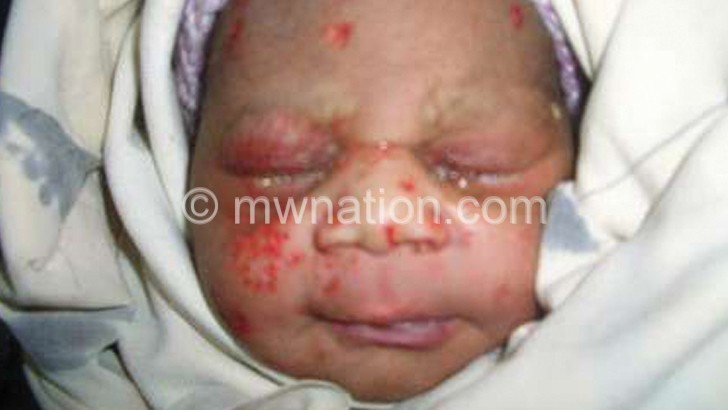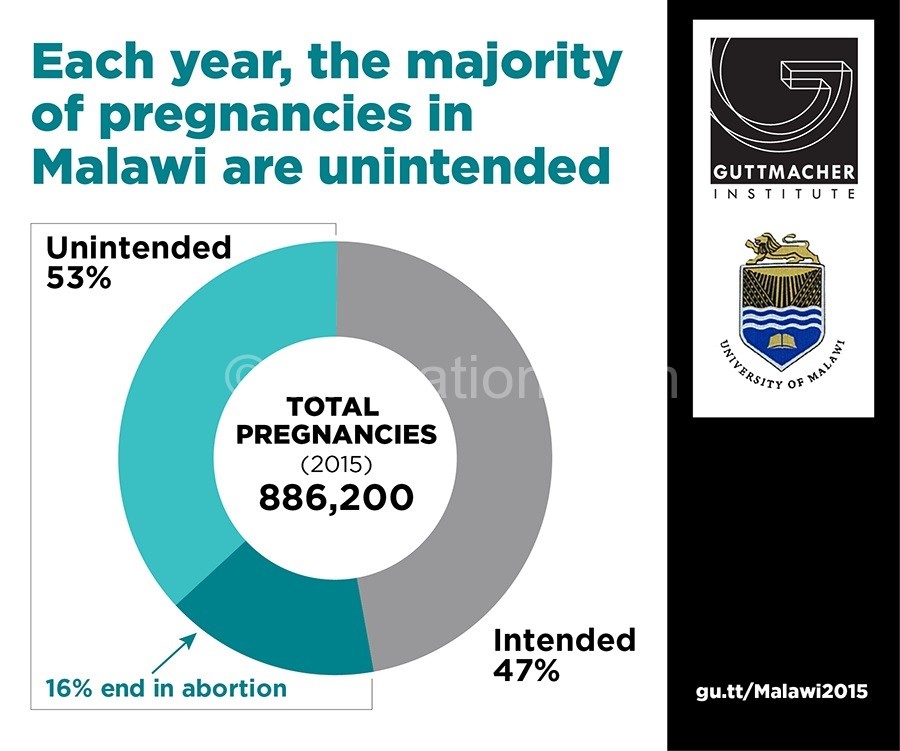After Baby Grace’s burial
Baby Grace’s death will remain a shocking tragedy unless the country ends time-honoured public health gaps that compel women to carry unintended pregnancies, JAMES CHAVULA writes.
The country was gripped with shock when the police announced last week Tuesday that children searching for wild fruits had found a newborn lying in the cold in a graveyard on the margins of Ekwendeni Mission in Mzimba.

“The gravesite is meant for nthayo, children born dead or those who die shortly after birth,” says Ekwendeni Mission Hospital principal nursing officer Esther Kawelama whose team christened the baby Grace because “she was found alive by God’s Grace.”
Such was the rough touchdown endured by the baby born in the bush. The children, startled by bloodstains in the grass and a faint cry of a baby in the bush, found her shivering and soaked by showers as red ants bit her tender skin.
It was bad news. Phones instantly went purring. The photograph of the binned baby went viral on the social media, especially WhatsApp groups.
Every baby is supposed to be wanted and celebrated, but there was nothing to smile about the lush lesions on the tender face of the baby dumps of the historic mission station, almost 20 kilometres north of Mzuzu City.
Red spots on her skin told it all—a chilling story of pain and abandonment suffered by newborns in a country where every woman is compelled to keep unintended pregnancies regardless of what she wants.
“The baby was denied a right to live and robbed of human dignity,” says the Reverend Nase Chunga of the CCAP who presided over her burial. “This is why we gave the four-day-old a funeral befitting an adult. It was complete with songs, preaching and eulogies, with sub-traditional authority Yohane Jere in attendance.”
The cleric is the chaplain of Ekwendeni Mission Hospital where almost 20 babies are cared for with the assistance of skilled health workers while Baby Grace was battling to live.
Outside, social media enthusiasts were trolling her mother as a heartless whore—worse than abortionists and campaigners pushing for liberalisation of colonial penal laws that only permit a woman to terminate a pregnancy when her life is in danger.
Many wondered why a right-thinking woman would terminate a pregnancy or abandon a baby when many people are climbing mountains, praying, fasting, gulping concoctions and bitter herbs or hiring hyenas (arranged impregnators) in a desperate attempt to become mother.
The litany of damning descriptions was lengthening when the baby breathed her last on Thursday around 3pm.
She may have had a name, but there Baby Grace did not live to know her parents and surname. Just about 100 people accompanied the remains of the baby, who died vomiting red ants, to the forested graveyard where she lies in a grave which was tampered with two days later.
Painful death
In his sermon, the reverend likened her mother to cold-blooded King Harold who killed multitudes of babies in search of Baby Jesus Christ whom Christians worship as the son of God.
“We still have Harolds in our midst,” he told the mourners. “Imagine God asking Baby Grace to tell her story. What would a baby denied by a mother say? What would she say after being dumped in the cold, left hungry and reduced to food for ants? What a painful four days she had!”
A sombre send-off it was, but the shock about her death should jolt Malawians to think critically about ‘constricted space for women in a cultural context where a recent study shows 53 percent of pregnancies were unintended in 2015.
“It’s sad we lost her,” laments the nurse, revealing this was a third dumped baby to be treated at the hospital in three years.
But every baby in the bush speaks of rejection, warns gender activist Emma Kaliya.
To her, Baby Grace’s brief life and deplorable death personify the tragic ending of thousands of pregnancies women carry against their will.
She termed it infanticide, saying: “It is revealing a lot of things that are wrong about sexual and reproductive health and rights (SRH) in the country. The tragedy points to an unintended pregnancy and a mother, who might have kept it to conform to social pressure, might have had enough.”
Kaliya wants an end to demeaning portrayals of women as killers eager to abort or to kill.
She explains: “Where are the men who compel women into such unfortunate decisions? When a woman decides not to keep a baby, she will find a way to get rid of it.
“I have spent almost a week imagining it was my daughter, killed by nkhulande or linthumbwi. It’s better to abort than to kill a newborn. Unfortunately, men, who just plant the seed and abandon the pregnant women, are vocal when it comes to the campaign for safe abortion.”
The women rights campaigner reckons the major downside is that women lack vital SRH information and many are not open about their sexual rights.
“They are not free to attain vital health services, including modern family planning methods, and to express what they want to do. Unfortunately, Malawi is a deceitful country where we talk more but do nothing to change the picture. We pretend we are holy and things are okay, when they are actually worse,” says Kaliya.
Contraception matters
The challenge of babies born by chance is immense.
In April, a study by the Centre for Reproductive Health at the College of Medicine (COM) in Blantyre and Guttimacher Institute in the US shows almost 53 percent of pregnancies in 2015 were unintended.
This accounted for almost 470 000 out of 886 000 pregnancies.
But almost 141 000 induced abortions were performed clandestinely.
“This translates to a rate of 38 abortions per 1 000 women aged 15-49, who are sexually active,” the researchers report.
For gynaecologist Dr. Chisale Mhango, who led researchers from COM, even draconian laws and religious teachings against abortion cannot stop a woman when she cannot carry an unintended pregnancy.
The babies found in the bushes could be ill-fated survivors.
“Meeting women’s contraceptive needs is a critical step towards decreasing the number of unintended pregnancies as well as the unsafe abortions and maternal deaths and injuries that result from these pregnancies,” says Dr Mhango.
The findings show 37 in 100 unintended pregnancies resulted in either miscarriages or unplanned birth, including the likes of forsaken Baby Grace.
The Ministry of Health reports that one in five married women and two in sexually active unmarried women want to avoid or delay a pregnancy, but are not using any contraceptive methods.
While Baby Grace’s runaway mother may have kept the pregnancy only to throw it away, thousands of women endure life-threatening injuries, disabilities and infertility as they use wires, sticks, soap, poisons, herbs and other hazardous substances to secretly eject the foetus as the law only allows safe abortion when the life of a woman is in danger.
This remains one of the preventable factors of maternal mortality rates in the country—574 deaths per 100 000 live births—remains one of the highest in the world.
The Health Ministry estimates that complications of unsafe abortions, often conducted by unskilled personnel in clinically perilous places, kill up to 18 in every 100 pregnant women dying in the country.
According to Dr. Thoko Msusa, COM’s Centre for Reproductive Health, with assistance from World Health Organisation (WHO), will embark on a study into the number of women dying of various complications of backstreet abortions.
Meanwhile, he recommends: “Government and its partners need to ensure that free and affordable family planning services reach all individuals to reduce unmet need for contraception and lower the incidence of unintended pregnancy.
“Programmes should offer comprehensive family planning services, including counselling for and availability of a wide range of contraceptive methods.”
However, contraceptives remain a contentious option among some religious communities, including Catholics who joined Evangelicals in the December 6 march against calls for government to liberalise abortion laws to reduce the ruinous impact of unsafe abortion and other costs of unintended pregnancies.
The CCAP Livingstonia Synod, which runs Ekwendeni Mission Hospital, backed the march amid a heated debate over demands by gender activists, lawyers and health experts for expanded grounds for safe abortions.
Scarcely 10 days after the protests, an adolescent girl died of complications of unsafe abortion at the Presbyterian Mission Hospital. According to an insider, the patient from Inkosi Mtwalo’s area arrived at the hospital in pain due to severe bleeding and a punctured, rotting womb.
“Being a Christian hospital, we abhor calls for abortion whether safe or not. However, we are at the receiving end of complications of clandestine abortions. Many claim to have suffered miscarriage, but we still help them because we have a calling to save lives,” says the source.
Kawelama, who ruled out the notion of unintended pregnancies because “every woman knows the aftermath of having sex without a condom or contraception”, affirmed the Presbyterian church’s stance against abortion
But her hospital also sees babies saved from neighbouring wilds.
“Only one in the three dumped babies I have seen was reunited with her mother. She is nine years old,” she explains, urging community members and leaders to always keep an eye on pregnant women.
She suspects Baby Grace was born of a sex worker who cannot be traced by neighbours because she has no permanent home.
Call to action
But she may as well be a single or married woman driven to the limits by a violent or negligent man who gets neither mention in the backlash. She may have been too constrained to meet basic needs of one more baby, an exception for safe abortion in Zambia which is constitutionally classified as a Christian republic.
In Malawi, a secular democracy, some of the unplanned babies literally go to the dogs. In June last year, Chilomoni residents in Blantyre had a rude awakening when dogs mauled half of a babyish body in decomposed state.
Likewise, Neno second magistrate Daniel Dzowela jailed Vilibesi Chingwale for dumping a newborn after she testified that she was struggling to raise two children.
These stories will keep haunting the country until every woman has the power to have children by choice, not sexual mishaps.
This is why the death of Baby Grace calls for endless minutes of silence, but transformative action to ensure every baby is celebrated. n





